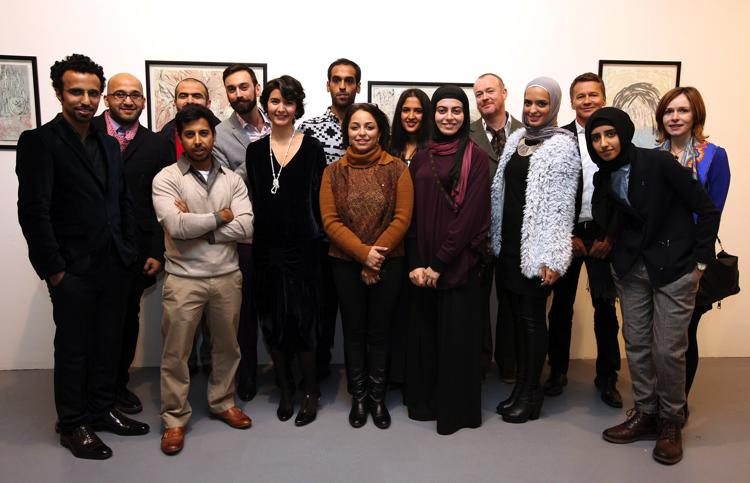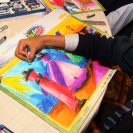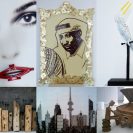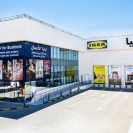It’s the opening night of the “Out of Kuwait” exhibition at the Edge of Arabia art gallery in London, and the 13 artists chosen for the exhibit were nearing the end of their tour of the Royal College of Art. In moments they would cross the street to unveil the pieces they had spent over a year working on, opening their interpenetrations of a drastically different Kuwait than might traditionally be expected to a critical British art scene. From organizers to artists, everyone was a jumble of nerves and excitement.
“I was so nervous, I expected everyone to just walk by my pieces without a second glance,” said photographer Ahmed Alshammeri. “But then, they stopped to analyze the photos and ask me how they reflected Kuwaiti culture, and gave me really great feedback.”
Alshammeri’s exhibit, titled Third Eye, is a series of monochromic photos that capture full stories in one decisive moment, an artist previously covered in the pages of bazaar. The street photos are his way of facing cultural boundaries of privacy and the rejection of public photos by Kuwaiti culture at large. His goal is to reflect the tradition and mores of the society, while challenging such notions.
This is what the “Out of Kuwait” exhibit was all about. Curated in collaboration with the British Council, The Royal College of Art and Kuwait’s Contemporary Art Platform, the collection of works was the product of a year of residency seminars and presentations organized by curator Alia Farid and professor David Rayson, Head of Painting at the Royal College of Art. During the program the artists were taken to key places unique to Kuwait, including visits to the desert, the Kuwait City souks, the fishing harbor, Al Hamra Tower, shopping malls and Kuwait University.
Yet, the artists found inspiration not just in the buildings and natural sprawls, but also in the details of these trips around their homeland. From the highways clogged with traffic to the little bursts of nature that line them, each piece of Kuwaiti life inspired something within the artists.
Abdulaziz AHumaidhi’s piece, Unraveling Without Moving, is a culmination of 2,500 mini toy cars painted black, white and red and placed in reminiscence of a Sadu rug. The piece is a direct reflection of the local car culture in Kuwait, and speaks to the stagnation it symbolizes in much of Kuwaiti culture.
Other artists chose to tackle the past and it’s impact on the future of the country. Adel Ashkanani and Aseel AlYaqoub’s short film “Kissin’ Cousins” attempts to retell Kuwait’s past through a fictional family in one traditional mud house, and using pop culture music to reflect the impact from the outside world.
“We were mimicking the ideas and memories of the past in a very traditional way, almost poking at the idea we have of what the past is,” said AlYaqoub. “We are saying that we should refrain from the nostalgia and that it’s problematic identifying ourselves within the constraints of ‘nationality’ and ‘traditional.’”
After much discussion, seminars, critique and painstaking work, the pieces were ready to be shipped to London for many of the artists’ first international exhibit. The artists had transcended mental boundaries and expressed their views in installations, video art, drawings, jewelry and visual research, but there was one more unexpected challenge that remained: the 100-kilogram cubicle built to house Thuraya Lynn’s animation piece “I Know Places” wouldn’t fit through the door. Lynn was prepared to cut the cubicle and repaint it, but her fellow artists found a way around the building to a larger exit.
“It was 5 degrees in London, but I was red and sweating like it was the middle of summer in Kuwait,” said AlShammeri. “Everyone had their own exhibit they were working on, but in the end it’s a group show.”
The teamwork and collaboration among the group helped create an all encompassing, eye-catching exhibit that showed in London from the 14th until the 28th of November. Yet, it was their own personal discoveries that made it a memorable show for the 350 opening night attendees, and for the rest of the duration of the show.
For more information contact The British Council Kuwait’s Art Projects Manager Reem Dawani at 2251 5512 ext. 111. Follow the British Council on Twitter or Instagram @kwBritish











